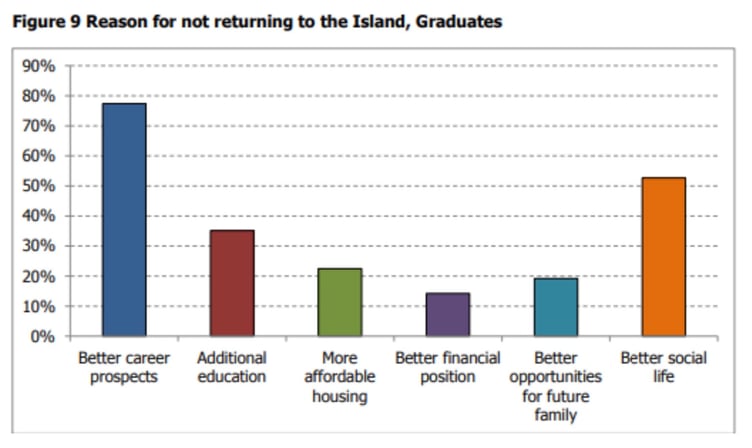A committee on population imbalance is calling for an improved social offering to retain young people in the island.
The Select Committee of Tynwald on Population Rebalancing 2022-23 aims to put forward solutions to rebalance the population as it says the island has more elderly people than young, creating an imbalance.
Its report says it’s evident that the Isle of Man ‘lacks social vibrancy’.
The committee said: ‘There are fewer entertainment facilities, entrepreneurial hubs, live music venues etc – that sense of buzz.
‘This offering is, in our opinion, yet another reason why young people either leave, or fail to return home from university, for example.
‘We must strive to create a vibrant environment which is attractive, and satisfies the needs of our local residents too.’
The select committee was established to clarify demographic challenges in the island, investigate the causes and imbalances, explore where existing policies may inadvertently contribute to the issues, and assess the measures that could be put in by government to tackle these challenges as well as come up with workable solutions.
Members are Rushen MHK Michelle Haywood, who is the chair, MLC Paul Craine, and Douglas Central MHK Chris Thomas.
As part of the report, the committee asked for evidence from the general public.
Graduates listed their reasons for not returning to the island, including better financial provision, more affordable housing, and additional education elsewhere.
Better opportunities for future family elsewhere was also listed, which the report also details as it states that the cost of bringing up children in the Isle of Man is putting some couples off having a family.
Among the most popular reasons were better career prospects and better social life elsewhere.
The report makes the recommendation that Tynwald is of the opinion that ‘the island’s night-time economy, streetscape and entertainment spaces have a role to play in attracting and retaining a younger populace’.
It also requests that the government facilitates and encourages the development of schemes to address gaps in the island’s lifestyle offering.
This comes during a time when the Covid-19 pandemic and cost of living are forcing businesses to close, especially on the high street, meaning there is little choice for young people when shopping local.
Locate Isle of Man currently provides information on targeted schemes to entice 18- to 35-year-olds to the Isle of Man.
These include the National Insurance Holiday, launched in 2019 and has been granted to 571 people who have returned or relocated, the Graduate Role Incentive, which encourages employers to provide development opportunities to recent graduates, and the Graduate Employability Training Programme, a two-week intensive training programme which provides an introduction to a variety of business skills.
The committee says it welcomes the initiatives but asks whether they are well-known to the targeted audience.
Over the last two censuses, for every three 20- to 24-year-olds moving to the Isle of Man, there have been between eight and 10 moving out.
The 2021 population profile shows fewer 20- to 29-year-olds than in any of the older age groups under 70 years.
This committee says the island is losing young adults and the significance of emigration in this age group is ‘considerable’.
It adds that the loss of young adults can become cumulative and impacts on population ageing and births.
Another recommendation the committee makes is that the Isle of Man be a ‘forever home’ and efforts should be made by Locate Isle of Man to market the island to key target demographics to redress population imbalances.
‘There remains a pressing need to address this,’ the committee says.
The Housing and Communities Board presented its action plan for 2022/23 to Tynwald last year which put a particular focus on affordable housing and budgeting loans.
Chair Chris Thomas explained the aim of the board is to look at affordable housing by adjusting thresholds for the existing shared equity first time buyer scheme in line with the current conditions.
As well as this, ‘kicking off a more fundamental review of affordable housing support’ to bring forward potential reforms by the end of the financial year is also part of the plan.
As part of the population rebalancing committee’s own recent inquiry, head of Locate Isle of Man Alison Teare said in her oral evidence that accommodation is the ‘number one challenge’.
She said: ‘It often depends where the person is relocating from as to what their specific challenges are.
‘The UK is still our biggest source of inward migration, for want of a better word. It is still the biggest source.
‘European migration has become more challenging, as it has moved outside their work permit system and into an immigration system, but largely the number one factor will be, not just the price or the cost, but the availability of accommodation.’
In short, there is a need for cohesion.
The committee said: ‘We defer to the existing work streams and undertake to monitor progress in our respective individual parliamentary roles.
‘The committee believes that contingencies need to be in place. For returning graduates and young professionals there is a need to ensure availability of suitable accommodation.’
As a result, it’s calling on the government to continue to work on delivering sustainable housing provision – ‘taking note of the synergy between housing and addressing our population challenge’.
The report addresses the challenges presented by having a largely elderly population.
It notes there is a ‘common misconception’ that the Isle of Man continues to be a destination of choice for retirement.
However, the age profile of the people who took up residence in the island between 2016 and 2021 shows that only 11.3% of the immigration group were aged over 65 years old.
Migration of people aged over 65 is ‘not a significant issue’, according to the committee but doesn’t help in redressing the population imbalance.
The over-65 population is growing primarily as a result of members of the working population becoming older.
The committee says: ‘As the largest cohorts in the island’s profile are between 50 and 64 it is inevitable that the total numbers aged over 65 years will grow over the next 15 years.
‘On average, people have also been living longer each decade but it is the larger numbers reaching 65 years that will cause the over 65 age group to grow much more than the later age of death.’
The committee recommends that, in the event of the government bringing forward residency requirement proposals based on age, income, or similar criteria, Tynwald expects consideration of compassionate exemptions on areas such as family ties, accompanied by extensive prior consultation beforehand.
It also recommended that the government and Tynwald recognises demographic change is with us, across all areas of our population, and calls on departments, boards and offices to factor this into their operational forward planning.
An older generation values and uses our health and social care systems, adds the committee, however this is the generation that also was most likely to own their homes and benefitted from generous pension schemes.
An ageing population will put pressure onto the social care system, requiring more of our working population to support the level of care necessary.

-(1).jpeg?width=209&height=140&crop=209:145,smart&quality=75)
.png?width=209&height=140&crop=209:145,smart&quality=75)

.jpeg?width=209&height=140&crop=209:145,smart&quality=75)
Comments
This article has no comments yet. Be the first to leave a comment.